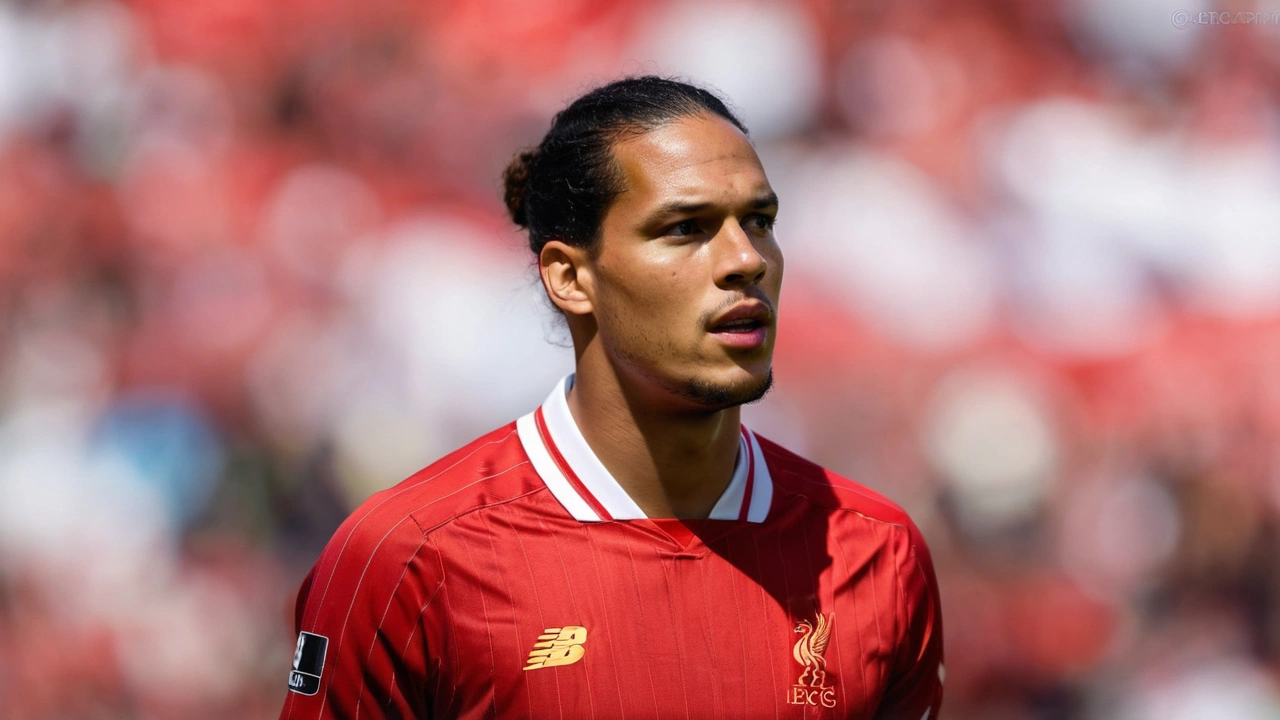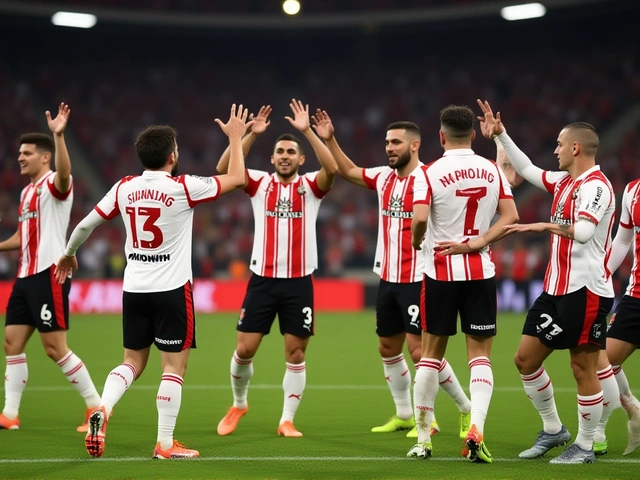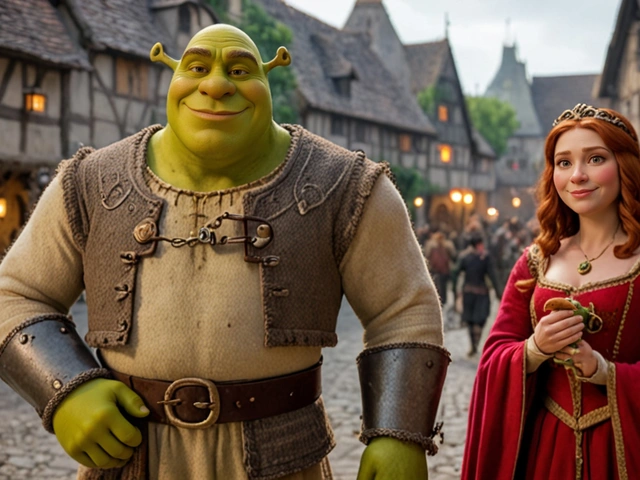Liverpool FC's New Transfer Strategy: The Virgil van Dijk Effect

Liverpool FC's Vision for the Future
Liverpool FC is known for its rich history and relentless pursuit of excellence. Ahead of the upcoming season, the club is laser-focused on refining its transfer strategy to build a formidable squad. The approach is multifaceted, aimed not only at securing technically skilled players but also at finding those who align with Liverpool's strong cultural ethos. This strategic pivot is heavily influenced by one man—Virgil van Dijk.
The Van Dijk Influence
Virgil van Dijk has been a transformative figure for Liverpool since his arrival in 2018. His towering presence, exceptional defensive skills, and unparalleled leadership qualities have made him a cornerstone of the team’s recent successes. His ability to read the game and inspire teammates has set a new gold standard at Anfield. He is more than a player; he is a role model whose influence stretches far beyond the pitch.
Van Dijk's impact can't be measured merely by statistics such as interceptions, tackles, or aerial duels won, although they are impressive. What stands out is his ability to elevate those around him. Young players look up to him, new recruits see him as a benchmark, and even the most seasoned veterans find his commitment infectious. The club's decision-makers have taken notice, and Van Dijk’s attributes are front-and-center in Liverpool’s recruitment criteria.
A Comprehensive Transfer Strategy
Liverpool's transfer policy has historically been focused on technical ability and performance metrics, but the new approach incorporates a broader set of attributes. The club is now equally concerned about a player's adaptability to Liverpool's cultural and ethical standards. Van Dijk exemplifies these qualities, and thus the club aims to fill the squad with players who can both perform on the field and respect the values off it.
This change in transfer philosophy means extensive background checks, character assessments, and a rigorous vetting process to ensure prospective players are not just skillful but also a good fit for the team spirit. While performance data and technical evaluations remain important, psychological profiles and character traits are gaining unprecedented importance.
Interweaving Experience and Youth
The emphasis on character and culture naturally complements Liverpool’s existing focus on nurturing young talent through its academy. Historically, the club has found immense success by integrating academy graduates into the first team. With the new transfer strategy, this focus has become even more pronounced. Prospective new signings are not just viewed as immediate solutions but as long-term investments who can grow within the system.
Virgil van Dijk’s leadership serves as a beacon for these young talents. His journey offers numerous lessons on professionalism, hard work, and continuous improvement. The club's coaching staff frequently uses his career trajectory and work ethic as teaching tools, showing youngsters what it takes to succeed at the highest level.
The Academy’s Role in Liverpool’s Success
The fluctuating fortunes of football necessitate a solid player development pipeline. Liverpool’s academy has been a fertile ground for producing world-class talent, and there's a renewed focus on this area. Managers and scouts consistently monitor the progress of younger players, ensuring they receive the right kind of mentorship and opportunities to hone their skills.
Players like Trent Alexander-Arnold, who progressed through the academy to become an essential first-team member, serve as a testament to the club’s successful player development approach. These home-grown talents often embody the club’s ethos more deeply, having been imbued with it from a young age. Hence, the academy isn't just a source of players but one of cultural reinforcement.
Transfer Market Maneuvers
Simultaneously, Liverpool remains active in the transfer market to acquire talent that complements its young prospects. The trick is to strike a balance between established stars and younger players who can be mentored and developed. Every signing aims to add a new dimension to the squad while aligning with the 'Liverpool Way.'
Recent acquisitions and target profiles indicate a methodical approach. The analysis involves not just scouting but also psychological profiling, fitness assessments, and even community engagement activities. Liverpool seeks not just players but ambassadors—figures who can represent the club well both on and off the pitch. This rigorous approach minimizes risks and maximizes the chances of a smooth integration, something exemplified by Van Dijk’s seamless transition to Liverpool’s defensive line.
Looking Ahead
The upcoming season presents a unique set of challenges and opportunities for Liverpool FC. The refined transfer strategy aims to keep the squad competitive in both domestic and international arenas. By taking a holistic view that marries character development with technical skill, Liverpool is laying a foundation for sustained success.
Virgil van Dijk’s influence will undoubtedly continue to be a guiding force. His experiences and expertise will serve as invaluable assets as the club navigates the complexities of modern football. With the combination of strategic signings and robust youth development, Liverpool is well-positioned to remain a footballing powerhouse.
Conclusion
Liverpool’s current approach to building a squad is as comprehensive as it is ambitious. The renewed transfer strategy, centered around Virgil van Dijk’s influence, is designed to create a team that is not only skilled but also cohesive and resilient. By focusing on character as much as ability, and by integrating young talent from its academy, Liverpool is aiming for a future where excellence is the norm. This strategy could well set the standard for other clubs to follow, as they witness Liverpool’s relentless pursuit of perfection both on and off the pitch.






Ramesh Modi
August 12, 2024 AT 23:13Ah, the van Dijk effect-an echo, a reverberation, a seismic shift in the very soul of Liverpool! In the grand theatre of football, where legends are forged in fire, his presence is a lighthouse, a beacon, a moral compass, daring the club to stride beyond mere talent and into the realm of character! The very fabric of recruitment now trembles under the weight of his example, demanding not only feet that dance but hearts that beat with integrity! It is as if the Reds have discovered a new alphabet, where each letter spells out humility, resilience, and relentless ambition! This philosophical overhaul, dear readers, is nothing short of a renaissance painted in red and white!
Ghanshyam Shinde
August 16, 2024 AT 10:33Wow, because we all needed another checklist, right? As if Virgil's beard could magically sort out the next signing. Simple logic: copy‑paste his qualities, hope for the best.
Charlotte Louise Brazier
August 19, 2024 AT 21:53The emphasis on character is a bold move, and it resonates deeply with the spirit of the game. I see this as a strategic safeguard, ensuring that new arrivals are not just technically adept but also culturally compatible. By mirroring Van Dijk’s professionalism, Liverpool cultivates a locker‑room atmosphere where young talents can thrive. This approach could also reduce the likelihood of off‑field distractions that derail even the most gifted players. Moreover, it reinforces the club’s long‑term vision, blending immediate performance with sustainable growth. It's a win‑win for the fans, the academy, and the board alike.
SAI JENA
August 23, 2024 AT 09:13Incorporating such rigorous character vetting aligns perfectly with the club’s ambition to build a cohesive unit. It sends a clear message that professionalism is as valued as raw skill. This synergy between talent and temperament will, I believe, forge a more resilient squad capable of handling pressure both on and off the pitch.
Donny Evason
August 26, 2024 AT 20:33From a cultural standpoint, Liverpool is setting a benchmark that other clubs might soon emulate. By championing the ‘Liverpool Way’, they’re not just selling football; they’re exporting a lifestyle, a set of values that transcend the stadium. This is the kind of strategic branding that cements global loyalty.
Hariom Kumar
August 30, 2024 AT 07:53Absolutely love this direction! 🌟 Embracing both talent and character will only make the Reds stronger. Go Liverpool! 💪
Phillip Cullinane
September 2, 2024 AT 19:13The modern transfer market is a labyrinth of data points, scouting reports, and ever‑shifting financial constraints. Clubs that overlook the psychological profile of a player risk integrating a talent that may never align with the collective ethos. Liverpool’s new paradigm, anchored by Van Dijk’s archetype, represents a sophisticated synthesis of hard metrics and soft attributes. From a performance‑analysis standpoint, the emphasis on aerial duels, interception rates, and progressive pass percentages remains paramount. Yet, the parallel stream of character assessments-leadership aptitude, community involvement, and resilience under pressure-adds an indispensable layer to the decision‑making matrix. The scouting department now employs psychometric testing akin to what elite corporations use for executive recruitment. This ensures that the player’s mentality can withstand the scrutiny of media, fan expectations, and the relentless pace of the Premier League. Moreover, the club’s integration protocols involve mentorship pairings, where seasoned veterans like Van Dijk serve as cultural anchors. These pairings accelerate the acculturation process, allowing newcomers to internalize the 'Liverpool Way' more organically. Financially, this holistic approach mitigates the risk of costly transfer failures, as the probability of a misfit diminishing over time is reduced. Strategically, it fosters a sustainable pipeline where youth academy prospects are groomed under the same philosophical umbrella. The synergy between seasoned signings and home‑grown talent creates a feedback loop that reinforces both performance and identity. Critics may argue that such rigor could slow down the acquisition of immediate‑impact players, but the long‑term dividends are evident. In an era where clubs chase quick fixes, Liverpool’s patience and methodical planning stand out as a blueprint for enduring success. Ultimately, the Van Dijk effect is less about a single defender and more about a cultural renaissance that could redefine transfer strategies globally.
Janie Siernos
September 6, 2024 AT 06:33While the moral high ground is admirable, let’s remember that football is a game, not a sermon. Substance must still match style.
joy mukherjee
September 9, 2024 AT 17:53I appreciate the holistic approach-it respects both the player's skill set and their personal growth. Balancing competitive edge with cultural fit could be the key to long‑term success for any top club.
Rob Chapman
September 13, 2024 AT 05:13Nice move by Liverpool, blending talent with temperament.
Delaney Lynch
September 16, 2024 AT 16:33Could this new strategy set a precedent for other clubs looking to foster unity and resilience? It certainly raises interesting possibilities!
Nicholas Mangraviti
September 20, 2024 AT 03:53Sounds like a win‑win.
Jared Greenwood
September 23, 2024 AT 15:13Finally some common sense-character matters as much as skill.
Sally Sparrow
September 27, 2024 AT 02:33All this talk about culture is just a smokescreen for failing to secure marquee signings. The club needs more star power, not just feel‑good narratives.
Eric Yee
September 30, 2024 AT 13:53Interesting shift, blending the gritty Liverpool spirit with a modern recruitment lens-could be a game‑changer.